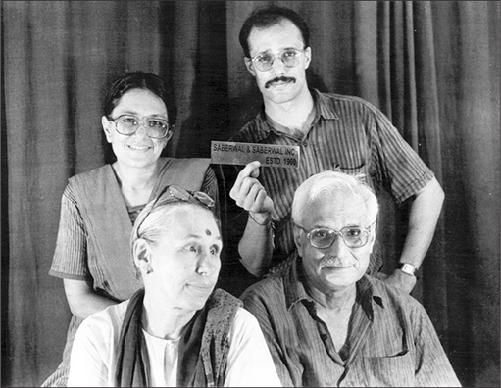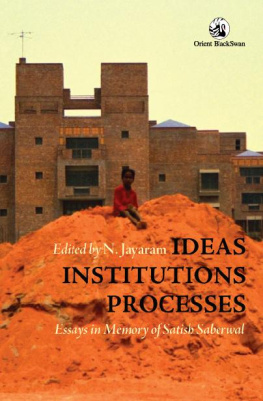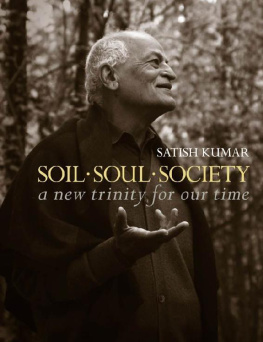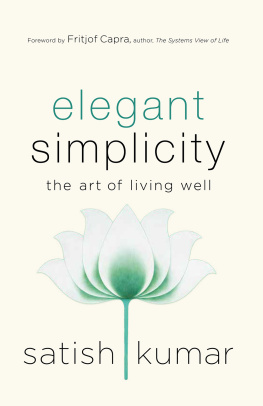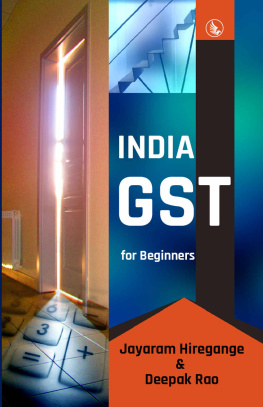Ideas, Institutions, Processes
For our entire range of books please use search strings " Orient BlackSwan ", " Universities Press India " and " Permanent Black " in store.
Satish Saberwal and family. Courtesy of Mrs Edith Saberwal
Ideas, Institutions, Processes
Essays in Memory of Satish Saberwal
Edited by
N. J AYARAM
IDEAS, INSTITUTIONS, PROCESSES
Orient Blackswan Private Limited
Registered Office
3-6-752 Himayatnagar, Hyderabad 500 029 (Telangana), India
e-mail:
Other Offices
Bangalore, Bhopal, Chennai, Ernakulam,
Guwahati, Hyderabad, Jaipur, Kolkata,
Lucknow, Mumbai, New Delhi, Noida, Patna
Orient Blackswan Pvt. Ltd. 2014
First published 2014
eISBN 978-81-250-6328-5
e-edition:First Published 2016
ePUB Conversion: .
All rights reserved. No part of this publication may be reproduced, distributed, or transmitted in any form or by any means, including photocopying, recording, or other electronic or mechanical methods, without the prior written permission of the publisher, except in the case of brief quotations embodied in critical reviews and certain other noncommercial uses permitted by copyright law. For permission requests write to the publisher.
Contents
S atish Saberwal (19332010), formerly Professor of Sociology at the Centre for Historical Studies, Jawaharlal Nehru University, was a sociologist among historians and an historian among sociologists. Known for his erudite scholarship, impeccable professionalism, charming sense of humour and, above all, extraordinary warmth, he has left a lasting imprint on the social sciences. A gentleman scholar, he was a model worthy of emulation. This volume pays tributes to his memory. Put together here are reflections and studies by scholars who had known Saberwal in different capacities and for varying periods; but all of them held him in the highest regard. The essayists here include his close friends (T. N. Madan, Stig Toft Madsen), esteemed colleagues (Gopal Guru, M. N. Panini, Romila Thapar, Susan Visvanathan), illustrious students (G. Arunima, Rohan D'Souza, Sujata Patel, M. Rajivlochan, Gail Pearson), and ardent admirers (Amita Baviskar, Ashwini Deshpande, Sasheej Hegde, Nandini Sundar). For me, he was a friend, philosopher, and guide.
The volume is divided into four sections. The first section introduces Saberwal, the scholar and his work: N. Jayaram profiles Saberwal as a gentleman and scholar and outlines his salient contributions; T. N. Madan, a long-time friend of the Saberwals, presents a memoir; and Nandini Sundar and Amita Baviskar engage in an informative and insightful conversation with Saberwal. The three chapters in the second section deal with disciplinary ruminations: Sujata Patel examines the challenge of global modernity for sociology in India; Sasheej Hegde revisits the scholarly engagement with traditions; and Gopal Guru discusses the location of the Dalit movement in mainstream sociology.
The third section is devoted to studies in history: Romila Thapar discusses chiefdoms and incipient kingdoms in the Mahabharata; Gail Pearson analytically documents the nineteenth-century consultations for commercial laws; G. Arunima analyses the problem of identity in the early Malayalam novels; and Rohan D'Souza traces the environmental history of the Indus Water Treaty.
The fourth and final section focuses on studies in institutions and processes: Susan Visvanathan discusses the question of alternative education through a study of an experiment in Tiruvannamalai in Tamil Nadu; Stig Toft Madsen explains the bifurcation of the Karnataka State Farmers' Association in the wake of the Inter-Continental Caravan; Ashwini Deshpande examines the interrelations between deprivation, caste inequality, and the Maoist conflict; M. Rajivlochan discusses the ideology and activities of the Bamcef; and M. N. Panini analyses the conundrums of environmentalism. Further, I have added a bibliography of Saberwal's works.
I am thankful to all the contributors to the volume for their valuable essays and indulgent patience. The interview by Nandini Sundar and Amita Baviskar first appeared in Contributions to Indian Sociology (42 [3]) in 2008, and Gopal Guru's chapter, in Economic and Political Weekly (28 [14]) in 1993. Romila Thapar's chapter borrows from material that previously appeared in The Past Before Us: Historical Traditions of Early North India published by Permanent Black and Harvard University Press in 2013 and Rohan D'Souza's chapter in Journal of International Relations (9 [I & II]) in 2011. I thank the editors and publishers of these journals and books for permitting us to reproduce them here. Thanks are also due to the anonymous referee for his critical reading of the manuscript and valuable suggestions.
Edith, Gayatri, and Vasant have all been part of this project since its inception. I thank them for all assistance, and more so for their continued affection. Being a close friend of Edith and sharing my admiration for Satish Saberwal, Viji, my wife, has been particularly supportive of this festschrift; I thank her.
I recall with appreciation Mimi Choudhury's kind invitation to me to put together this festschrift. I thank her for her support and patience.
N. J AYARAM
Mumbai
Publishers Acknowledgements |
F or permission to reproduce copyright material in this volume, the publisher wishes to make the following acknowledgements.
For a Sociology of India: Satish Saberwal in Conversation with Nandini Sundar and Amita Baviskar'. Originally published in Contributions to Indian Sociology (New Series), Volume 42, No. 3 Copyright 2008 Institute of Economic Growth, New Delhi. All rights reserved. Reproduced with the permission of the copyright holder and the publisher Sage Publications India Pvt. Ltd, New Delhi.
Economic and Political Weekly for Dalit Movement in Mainstream Sociology', 28 (14), 1993, pp. 57073.
Permanent Black and Harvard University Press for Chiefdoms and Early Kingdoms in the Mahabharata', an earlier version of which appeared in the chapter The Mahabharata in Romila Thapar, The Past Before Us: Historical Traditions of Early North India, Ranikhet and Cambridge, 2013.
Journal of International Relations for Towards an Environmental History of the Indus Water Treaty'. Originally published as The Indus Water Treaty and Climate Change: An Environmental History of Hydro-politics', 9 (I & II), 2011 (ISSN: 22187391), pp. 104115.
I
Introduction
The Scholar and His Work
| A Gentleman among Scholars; A Scholar among Gentlemen N. JAYARAM |
He was a scholar, and a ripe and good one;
Exceeding wise, fair-spoken, and persuading;
Lofty and sour to them that lovd him not,
But to those men that sought him sweet as summer.
William Shakespeare
O n 20 October 2010, the ruthless hand of death snatched from our midst Professor Satish Saberwal, a gentleman among scholars and a scholar among gentlemen. Affectionately known to his friends as Satish and respectfully addressed as Saberwalji, he finally lost his two-year-long fight against amyotrophic lateral sclerosis (ALS). Often referred to as 'Lou Gehrig's Disease', ALS is a progressive neurodegenerative disease that affects nerve cells in the brain and the spinal cord. With his passing away, the academic world has lost an erudite scholar, an impeccable professional, and an ideal citizen. Personally, I have lost a friend, philosopher, and guide.

